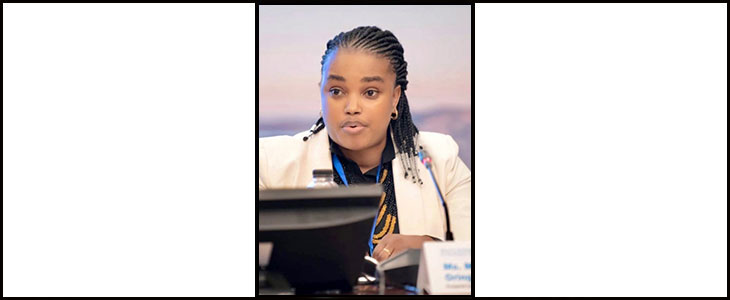
ACAMS Today recently caught up with Malaika Oringo, who is the founder and CEO of Footprint to Freedom, as well as director of the African Survivor Coalition. She is a distinguished expert in anti-human trafficking (HT) efforts, climate change and the eradication of gender-based violence. She has dedicated her life to combating these heinous crimes and empowering victims and survivors to become leaders.
Oringo’s story serves as a reminder that determination and compassion can make a significant difference. Growing up in an environment where women faced systematic silencing, she advocates passionately for survivors, giving voice to those often silenced by society.
Oringo empowers survivors to advocate for critical causes such as abolitionist legislation, gender equality, climate action, labor rights, safe migration policies, victim support and financial inclusion. As the director of the African Survivor Coalition, she creates a resilient survivor community throughout Africa.
Oringo’s expertise guides victim-centered investigations, challenging traditional paradigms. Her influence extends globally, collaborating with entities such as the Salvation Army, the Organization for Security and Co-operation in Europe, Finance Against Human Trafficking and the International Labour Organization. She has spoken at the European Union Parliament and engaged in the United Nations General Assembly. An educator, trainer, mentor, speaker and tireless advocate for victims’ rights, Oringo believes in the power of survivor-led efforts.
Since 2008, Oringo has reached over 20,000 individuals in vulnerable communities across Europe, Africa and America. Collaborating with more than 500 global nongovernmental organizations (NGOs) and law enforcement agencies, she provides critical insights into victim support, survivor inclusion and engagement. Oringo’s commitment and influence have earned her numerous awards, including ChildX, Queen Silvia of Sweden, DNAforAfrica and the Voice Achiever Award in the Netherlands.
ACAMS Today (AT): If you are comfortable doing so, will you please share with ACAMS Today your survival story?
Malaika Oringo (MO): Like many young girls growing up in vulnerable circumstances, I had a simple yet powerful dream: to go to school and build a better future. When I was offered what seemed like a lifechanging opportunity to study abroad, I accepted with hope and trust. But instead of education, I found myself trapped in a cycle of exploitation.
What ultimately saved me was access to a scholarship that allowed me to reclaim that original dream. Education became not only a pathway to healing but also a foundation for leadership. It gave me the knowledge and tools to challenge the very systems that enable HT and exploitation.
Today, I lead Footprint to Freedom, a survivor-led organization that empowers others and drives systemic change. I collaborate with institutions like United Nations Office on Drugs and Crime (UNODC), United Nations Development Programme (UNDP), Finance Against Slavery and Trafficking, as well as various global NGOs to push for survivorcentered solutions. My story is not just one of survival—it’s a call to action to invest in the potential of those most impacted by injustice.
AT: As an anti-HT expert, you advise survivors to be careful when sharing their survival story. Can you expand on why this advice is important and what recommendations you give to survivors when they are ready to share their story?
MO: Sharing a story of trauma can be both empowering and exposing. Too often, survivors are asked to recount their experiences without the safety nets of support, consent or long-term care. I always tell survivors: “Your story is yours—it’s not currency for others’ agendas.” When survivors are pushed to speak before they are ready, it can lead to retraumatization, emotional burnout and even exploitation in activist spaces.
Storytelling must be a choice, not a requirement.
When they do feel ready, I recommend survivors anchor their story in their values, not just their pain. Share from a place of strength, not just survival. Have clear boundaries and a support system in place before and after sharing. I also urge organizers and institutions to ensure safeguards like informed consent, trauma-informed facilitators and aftercare.
Survivor voices are powerful, but they should never come at the cost of our well-being.
AT: Can you share some of the gender-based violence (GBV) challenges you have faced and why you are trying to address this issue?
MO: As a woman from East Africa, GBV was normalized in many parts of my upbringing whether through silencing, shame or physical harm. HT was a continuation of that violence—where my gender, race and origin made me especially vulnerable to control and abuse.
Even after exiting exploitation, GBV didn’t end. It simply changed form. I encountered institutional barriers, systemic discrimination and a lack of trauma-informed services for survivors like me. The truth is that many systems are not built to protect women who have endured gender-based exploitation.
This is why GBV is central to my advocacy. Fighting trafficking without addressing GBV is like treating symptoms while ignoring the disease. There is a deep, often overlooked intersection between the two: Many women who are trafficked in adulthood were first exposed to violence and vulnerability as girls.
We need survivor-led strategies that challenge harmful norms, educate communities and reframe survivors not as broken but as resilient agents of change. Addressing HT requires dismantling systems of oppression and replacing them with structures rooted in equity, justice and care.
AT: What advice would you give to survivors to prevent them from falling victim to HT or being exploited again?
MO: The first piece of advice I give is this: Your vulnerability is not your fault—but awareness is your power. Many survivors fall into re-exploitation because the systems that failed them once haven’t changed.
To break the cycle, survivors need access to safe housing, legal status, education, financial independence and community. These are not luxuries: They’re rights. My advice is to stay connected to survivor-led communities where you can find solidarity and mentorship.
Also, ask questions about opportunities, organizations and people. Trust your instincts. If something feels off, it often is.
Lastly, invest in your healing. Healing is not a destination—it’s a foundation. When you’re grounded in your worth, it becomes much harder for others to devalue you. And always remember that you are not alone. There is a growing movement of survivor leaders who are walking this path beside you.
AT: How can financial institutions (FIs) help HT survivors?
MO: FIs have enormous power to be allies in the fight against HT. Survivors need more than rescue; they need reintegration and that starts with access to safe, inclusive financial systems.
Banks can create trauma-informed financial services that recognize the barriers survivors face, such as identity theft, coerced debt and lack of documentation. Offering “clean slate” bank accounts or survivor-centered credit repair programs is a good start.
FIs should also be trained to identify red flags in transactions that could indicate exploitation. But detection alone is not enough; we need prevention and remedy.
Survivors must also be included in decision-making. By consulting with survivor leaders when developing policies or products, institutions can create solutions that are practical and safe.
Financial inclusion isn’t charity. It’s justice. It restores dignity, opens opportunities and ensures survivors are not pushed back into cycles of vulnerability.
AT: Can you tell us more about Footprint to Freedom and how FIs or individuals could contribute to this organization?
MO: Footprint to Freedom is a survivor-led organization and grassroots movement driving systemic change in the fight against HT and modern slavery. Rooted in lived experience, it empowers survivors to become leaders, advocates and solution builders through its unique Footprint Disciple Approach, which is a leadership multiplier model that transforms trauma into action.
Operating across Africa and Europe, the organization works to address the root causes of exploitation by advocating for abolitionist legislation, gender equality, climate justice, safe migration, labor rights and financial inclusion. Its approach is grounded in an Afrocentric, trauma-informed framework that ensures interventions are community-driven and culturally relevant.
Footprint to Freedom offers leadership training, trauma recovery support, economic empowerment programs and survivor-led advocacy initiatives. It works closely with institutions such as UNODC, UNDP and Finance Against Slavery and Trafficking to integrate survivor voices into global anti-trafficking frameworks.
The organization also leads the African Survivor Coalition (ASC), a Pan-African platform that builds the capacity of survivor leaders in scaling to reach 54 African countries. Through ASC, Footprint to Freedom amplifies African survivor narratives, strengthens policy influence and fosters cross-border solidarity to combat trafficking with locally informed, survivor-driven solutions.
AT: What kind of legacy do you hope to leave behind?
MO: I hope to leave behind a legacy of liberation for survivors, for women and for communities that were once silenced. I want people to remember that healing is possible, justice is necessary and power can be reclaimed.
My dream is to see a world where survivor leadership is not the exception but the norm and where institutions no longer speak about us without us.
I want the systems that once excluded us to be transformed by our presence, our wisdom and our resilience. And I hope the next generation of survivor leaders will stand taller, speak louder and go even further than I ever could.
AT: Anything else you would like to share with the anti-financial crime (AFC) community?
MO: To the AFC community: Your work matters. You are part of a global ecosystem that has the power to shift entire systems. But remember real change is not just about policies or procedures. It’s about people.
Engage survivors not just as beneficiaries but as partners. Invest in lived experience. Make space for those who were once invisible.
And to survivors reading this: Your story doesn’t end in pain. It continues in purpose. Your voice is powerful and the world needs it more than ever.
Interviewed by Karla Monterrosa-Yancey, CAMS, editor-in-chief, ACAMS, editor@acams.org










